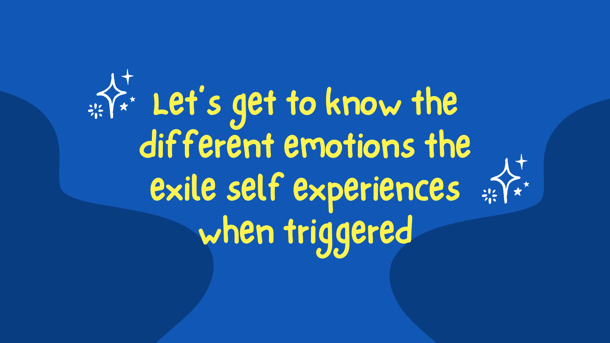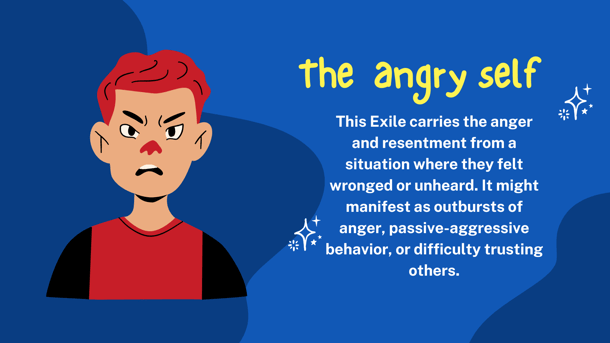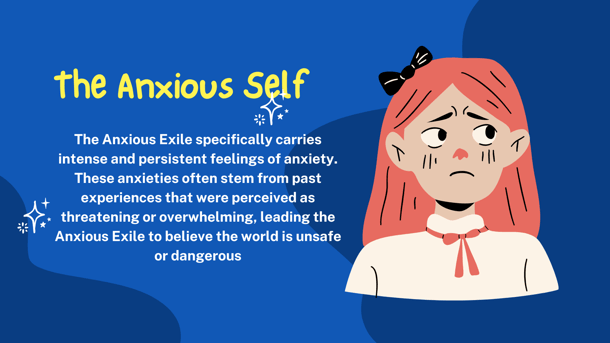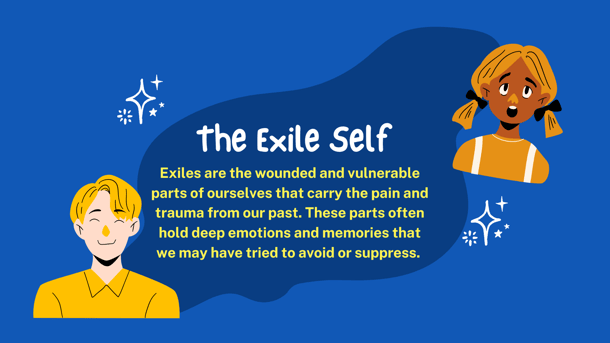Understanding Our Inner Parts
An Introduction to Internal Family Systems Therapy


Mapping the Internal Landscape
Have you ever felt like there's a chorus of voices inside your head, each with its own opinions and agendas? This internal dialogue system is the essence of Internal Family Systems (IFS) therapy.
IFS proposes that our minds are not singular entities, but rather constellations of parts, each with its own unique role, emotions, and beliefs. These parts can be helpful protectors, wounded exiles, or even critical managers, all trying to navigate the complexities of life.
Understanding these parts and their interactions is crucial for fostering healthy self-esteem. Let's delve deeper:
Understanding Internal Family Systems (IFS) Therapy
Internal Family Systems (IFS) therapy is a therapeutic approach that recognizes and works with the various parts within an individual's mind. Developed by Richard C. Schwartz, IFS is based on the belief that each person has an internal system of parts that interact with one another.
In IFS therapy, the goal is to help individuals develop a greater understanding and awareness of their internal parts, and to foster a harmonious relationship between them. By doing so, individuals can gain insight into their own thoughts, emotions, and behaviors, and ultimately achieve a greater sense of self-compassion and well-being.
IFS therapy views each part as having its own unique perspective and purpose. Some parts may be protective, working to keep us safe from harm or emotional pain. Other parts may be wounded, carrying the burdens of past experiences and traumas. And still, other parts may take on the role of critical managers, constantly judging and evaluating our actions.
By understanding the roles and motivations of these different parts, individuals can begin to develop a more compassionate and curious stance towards themselves. Rather than seeing their internal conflicts as a sign of weakness or dysfunction, IFS therapy encourages individuals to view them as opportunities for growth and healing.
















Exploring the Internal Parts
Within the framework of IFS therapy, there are three main categories of parts: exiles, managers, and firefighters.
Inner (Core) Self:
The "Self" in Internal Family Systems (IFS) therapy is not a separate entity but rather a state of being. It's the calm, compassionate, and wise center within each of us that observes and guides the different parts (Exiles, Managers, Firefighters) without judgment.
Qualities of the Self:.
Stable: The Self remains calm and stable even when other parts are experiencing strong emotions.
Observant: The Self can observe your thoughts, feelings, and behaviors without getting caught up in them.
Connected: The Self feels a sense of connection to yourself, others, and the world around you.
Compassionate: The Self holds all parts, including Exiles, Managers, and Firefighters, with unconditional love and acceptance.
Wise: The Self possesses a deep understanding of your whole being and can see things from a neutral and objective perspective.
Confident: The Self is inherently confident and secure, not needing validation from others.
Curious: The Self is naturally curious and open-minded, eager to learn and grow.
Present: The Self is fully present in the moment, not dwelling on the past or worrying about the future.
Here are some examples of how the "Self" manifests:
Observing thoughts and feelings without judgment: The Self can observe the thoughts and feelings of different parts without becoming entangled in them.
Leading with compassion and understanding: The Self approaches all parts of the system with compassion and understanding, even the exiled and manager parts.
Making conscious choices: The Self allows us to make conscious choices based on our values and needs, rather than being controlled by reactive parts.
Connecting with others authentically: The Self allows us to connect with others authentically, without being driven by people-pleasing or controlling tendencies.
Feeling a sense of purpose and meaning: The Self helps us connect with our sense of purpose and meaning in life, beyond the influence of different parts.
Experiencing the Self:
Meditation: Engaging in mindfulness meditation can help you quiet your mind and connect with your inner stillness, which is a reflection of the Self.
Journaling: Reflecting on your values, goals, and what truly matters to you can help you connect with your authentic self.
Nature: Spending time in nature can help you feel a sense of peace and connection, which can be conducive to experiencing the Self.
Acts of kindness: Performing acts of kindness for others can help you connect with your compassionate and giving nature, which is an aspect of the Self.
Therapy: IFS therapy specifically focuses on helping you connect with your Self and learn to lead your life from this centered and empowered place.
It's important to understand that the Self is not a static state; it's a capacity that develops over time. As you practice connecting with your Self, you'll become better at accessing its wisdom and making choices aligned with your authentic values and needs.
Here are some additional points to consider:
The Self is not the same as your ego or personality. Your ego is a part of your personality that is concerned with self-image and external validation, while the Self is concerned with your authentic self and inner well-being.
Connecting with the Self is a journey, not a destination. Be patient with yourself and celebrate your progress along the way.

Exiles ( Wounded self):
Exiles are the wounded and vulnerable parts of ourselves that carry the pain and trauma from our past. These parts often hold deep emotions and memories that we may have tried to avoid or suppress. Exiles often carry intense emotions like sadness, shame, fear, or anger, and because of their vulnerability, Managers and Firefighters try to keep them hidden or suppressed. Here are some examples of Exiles and the emotions they might hold.
Trauma-Based Exiles:
The scared child: This Exile holds the fear and helplessness experienced during a traumatic event. It might manifest as anxiety, panic attacks, or nightmares.
The angry child: This Exile carries the anger and resentment from a situation where they felt wronged or unheard. It might manifest as outbursts of anger, passive-aggressive behavior, or difficulty trusting others.
The grieving child: This Exile holds the sadness and loss associated with a difficult experience, like the death of a loved one or the end of a relationship. It might manifest as withdrawal, tearfulness, or difficulty expressing feelings.
Inner Child Exile: This could be a part that carries the unmet needs and desires from your childhood, leading to feelings of loneliness, abandonment, or inadequacy.
The Lonely One: This part might feel isolated and disconnected from others due to past experiences of rejection or exclusion.
The Sad Child: This part might carry sadness and grief from a past loss, such as the death of a loved one or the end of a relationship.
Shame-Based Exiles:
The hidden self: This Exile feels ashamed of its true self and hides from judgment and rejection. It might manifest as social anxiety, low self-esteem, or a constant sense of inadequacy.
The defective self: This Exile believes it is fundamentally flawed and unworthy of love or belonging. It might manifest as self-criticism, self-sabotage, or isolating behavior.
The angry self: This Exile holds onto anger turned inwards due to feeling unlovable or unacceptable. It might manifest as self-hate, depression, or self-destructive behavior.
It's important to remember that:
Exiles are not bad or wrong. They are simply parts of us that are trying to cope with pain in the best way they know how.
Exiles need compassion and understanding, not judgment.

Protective Managers ( Non-emergency response to the wounded self):
Protective parts try to shield the Exiles from further pain. Managers in Internal Family Systems (IFS) therapy are parts that aim to protect the individual from emotional pain by influencing their thoughts, feelings, and behaviors. They might manifest as critical voices, perfectionism, or people-pleasing behaviors.
Managers are the parts of ourselves that take on the role of controlling and organizing our lives. These parts often have high standards and expectations, and they work diligently to ensure that we meet these standards. Managers can be perfectionistic, critical, and driven by a fear of failure.
While managers can be helpful in certain situations, they can also become overbearing and exhausting.
Types of Manager Self
Seeking Approval:
People-pleasing: Always saying yes to others, even when it's inconvenient or harmful to yourself. Prioritizing the needs and desires of others over your own, creating resentment and inauthenticity.
Overachieving: Setting excessively high standards for yourself and feeling worthless when not met.
Comparing yourself to others: Feeling inferior or inadequate in comparison to others.
Bragging: Exaggerating achievements or boasting about possessions to feel accepted and validated.
Seeking external validation: Relying on the opinions of others to feel good about oneself, leading to dependence and vulnerability.
Compliance: Going along with the crowd or doing whatever others expect to avoid conflict or disapproval.
Caretaking: Prioritizing the needs of others at the expense of your own, leading to resentment and burnout.
Avoiding Painful Triggers:
Perfectionism: Striving for flawlessness and fearing any form of imperfection. Setting unreasonably high standards for oneself and others, often leading to anxiety and self-criticism
Procrastination: Avoiding tasks or decisions due to fear of failure or criticism.
Isolation: Withdrawing from social situations to avoid potential rejection or disappointment. Withdrawing from relationships to avoid feeling vulnerable or rejected.
Numbing: Engaging in activities like excessive work, television, or video games to distract from difficult emotions.
Overthinking: Ruminating on negative thoughts and scenarios, leading to anxiety and indecision.
Controlling Oneself:
Compartmentalization: Pushing away difficult emotions or memories, hindering emotional processing and healing.
Over-controlling: Trying to control every aspect of life to avoid feeling out of control, leading to rigidity and stress.
Controlling Others:
Controlling behavior: Dictating how others should behave and becoming frustrated when they don't comply.
Blame shifting: Avoiding responsibility for your own actions by blaming others.
Guilt-tripping: Manipulating others through guilt to get what you want.
Maintaining Harmony:
Caretaking: Putting others' needs before your own and neglecting your own well-being.
Minimizing problems: Downplaying your own feelings and needs to avoid upsetting others.
Ignoring conflict: Avoiding difficult conversations or situations to maintain peace.
It's important to understand that these are just a few examples, and the specific behaviors of manager parts will vary depending on the individual's history and experiences. However, by recognizing the underlying motivations of these parts, we can start to de-blend from them and empower the Self to make conscious choices based on our values and needs. This, in turn, can lead to a stronger sense of self-esteem and a more fulfilling life.
Here are some additional points to consider:
Managers often operate unconsciously, influencing our behavior without our awareness.
It's crucial to distinguish manager beliefs from your own authentic values.
Through IFS therapy, you can learn to unblend from your manager parts, allowing your Self to take the lead in making conscious and healthy choices
Protective Firefighters ( Emergency Response To Overwhelming Emotions):
Parts that take extreme measures to manage difficult emotions, often lead to impulsive reactions ( knee-jerk behaviors) or avoidance. They aim to provide temporary relief from extremely painful emotions. They often come in as a last resort to protect the vulnerable Exiles from further pain.
Unhealthy Coping Mechanisms:
Overindulgence: This can include overeating, substance abuse, excessive spending, or engaging in risky behaviors to numb emotional pain.
Withdrawal: Firefighters might lead individuals to isolate themselves from social situations, neglect responsibilities, or withdraw from enjoyable activities to avoid triggering emotions.
Compulsions: This involves repetitive behaviors like excessive cleaning, gambling, or checking things repeatedly to manage anxiety or discomfort.
Self-harm: In extreme cases, Firefighters might resort to self-harming behaviors to distract from emotional pain or punish themselves for perceived failures.
Aggression: This can manifest as verbal or physical aggression towards others or oneself as a way to vent frustration or gain control in overwhelming situations.
Helpful Firefighter Behaviors:
Distraction: Engaging in activities like exercise or hobbies to take your mind off negative emotions.
Humor: Using humor to lighten the mood and reduce anxiety.
Problem-solving: Actively taking steps to address a difficult situation.
Setting boundaries: Saying no to protect yourself from being overwhelmed or taken advantage of.
It's important to remember that:
These behaviors are coping mechanisms used by the Firefighter part to protect the Exiles, not malicious acts.
The goal of IFS therapy is not to eliminate Firefighter parts, but to understand their purpose and find healthier ways to manage difficult emotions and protect the Exiles.
The specific manifestation of a "firefighter" part will vary greatly from person to person depending on their unique experiences and needs.
Firefighter behaviors can change over time. What might have been helpful in the past may no longer be effective or even harmful.
How Parts Of Self Impacts Self- Esteem.
When protective parts, particularly firefighters and managers, dominate our internal system, they can significantly impact self-esteem. Here's how:
Critical voices: Protectors often engage in negative self-talk, diminishing our achievements and amplifying our flaws. This constant barrage can erode self-confidence and lead to feelings of inadequacy.
Perfectionism: The relentless pursuit of flawlessness, driven by managers, can leave us feeling like failures even at our best, creating a sense of worthlessness.
People-pleasing: This behavior, often driven by protectors, can lead to neglecting our own needs and sacrificing our values, fostering feelings of inauthenticity and low self-worth.
Mapping Your Inner Parts:
Exploring your inner parts can be a powerful tool for self-discovery and improving self-esteem. Here's how to get started:
Quiet reflection: Find a calm space and spend time observing your thoughts, feelings, and behaviors. Notice when certain patterns emerge, like self-criticism or avoidance.
Identify the parts: Ask yourself, "What part of me might be feeling this way?" Try naming the part and its role (e.g., "My inner critic is feeling threatened").
Connect with the Self: Once you identify a part, shift your focus to the Self. Imagine a wise and compassionate observer within you. Ask the part what it needs and why it behaves the way it does.
Unburden the Exiles: If you encounter an Exile, acknowledge its pain and offer compassion. Let it know it's safe and doesn't need to carry the burden alone.
Empower the Self: Practice connecting with your 'Self' more frequently. This allows you to make conscious choices based on your values and needs, rather than being controlled by reactive parts.
Remember: This process takes time and practice. Be patient with yourself and seek professional guidance if needed. By understanding and nurturing your inner parts, you can create harmony within your internal orchestra, leading to a more authentic and confident sense of self.
Additional Tips:
Consider journaling your experiences with different parts.
Practice mindfulness exercises to become more aware of your thoughts and emotions.
Seek support from a therapist trained in IFS therapy for deeper exploration and healing.
Conclusion
Internal Family Systems therapy offers a unique and powerful approach to understanding and healing the internal landscape of our minds. By recognizing and working with the various parts within us, we can cultivate greater self-awareness, self-compassion, and self-leadership.
Whether you're seeking personal growth, emotional healing, or a greater sense of self-esteem, IFS therapy can provide valuable insights and tools for navigating the complexities of life. Through this therapeutic approach, you can embark on a journey of self-discovery and transformation, ultimately leading to a more fulfilling and meaningful life.
Working with Internal Parts
IFS therapy involves a collaborative and respectful approach to working with internal parts. The therapist acts as a guide, helping individuals navigate their internal landscape and facilitating communication between the various parts.
Through guided visualization and dialogue, individuals can develop a deeper understanding of their parts and their roles within the internal system. This process allows for increased self-awareness and the ability to identify patterns of behavior and thought.
During IFS therapy, individuals are encouraged to cultivate a compassionate and curious attitude towards their parts. Rather than judging or dismissing certain parts, individuals are invited to explore their motivations, fears, and desires. This approach fosters a sense of self-acceptance and understanding.
As individuals become more familiar with their internal parts, they can begin to develop a sense of self-leadership. Self-leadership involves the ability to make choices and take actions that align with one's core values and desires, rather than being driven solely by the demands of the parts.
By cultivating self-leadership and fostering a harmonious relationship between the various parts, individuals can experience greater self-esteem, emotional well-being, and overall life satisfaction.
Benefits of Internal Family Systems Therapy
Internal Family Systems therapy offers numerous benefits for individuals seeking personal growth and healing:
Increased self-awareness: IFS therapy allows individuals to gain a deeper understanding of their thoughts, emotions, and behaviors.
Emotional healing: By connecting with and healing the wounded exiled parts, individuals can experience profound emotional healing and release.
Improved self-esteem: Developing a compassionate and curious attitude towards all parts of oneself can lead to increased self-acceptance and self-esteem.
Enhanced self-leadership: IFS therapy empowers individuals to become the leaders of their own lives, making choices that align with their core values and desires.
Stress reduction: By understanding and addressing the underlying causes of internal conflicts, individuals can experience a reduction in stress and emotional turmoil.
Conclusion
Internal Family Systems therapy offers a unique and powerful approach to understanding and healing the internal landscape of our minds. By recognizing and working with the various parts within us, we can cultivate greater self-awareness, self-compassion, and self-leadership.
Whether you're seeking personal growth, emotional healing, or a greater sense of self-esteem, IFS therapy can provide valuable insights and tools for navigating the complexities of life. Through this therapeutic approach, you can embark on a journey of self-discovery and transformation, ultimately leading to a more fulfilling and meaningful life.
